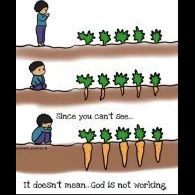-
Posts
1,588 -
Joined
-
Last visited
Reputation
511 GoodProfile Information
-
Gender
Male
Recent Profile Visitors
31,588 profile views
-

The earth is beginning to open her mouth (Revelation 12:15-16).
BornAgain490 replied to luigi's topic in Prophecy
Always be about our Father's business. That way, we will always be ready. Our redemption draws near. -
Psalm 139:14-16 I praise you, for I am fearfully and wonderfully made. Wonderful are your works; my soul knows it very well. My frame was not hidden from you, when I was being made in secret, intricately woven in the depths of the earth. Your eyes saw my unformed substance; in your book were written, every one of them, the days that were formed for me, when as yet there was none of them." Praise be to God forever. Amen 🙏
-
Joel 3:1-5 "“For behold, in those days and at that time, when I restore the fortunes of Judah and Jerusalem, I will gather all the nations and bring them down to the Valley of Jehoshaphat. And I will enter into judgment with them there, on behalf of my people and my heritage Israel, because they have scattered them among the nations and have divided up my land, and have cast lots for my people, and have traded a boy for a prostitute, and have sold a girl for wine and have drunk it. “What are you to me, O Tyre and Sidon, and all the regions of Philistia? Are you paying me back for something? If you are paying me back, I will return your payment on your own head swiftly and speedily. For you have taken my silver and my gold, and have carried my rich treasures into your temples."
-
Bring it!
-
Genesis 2:1 says "the HEAVENS and the earth WERE FINISHED" in six days. The creation of the heavens are in the beinning part of the six creation days. There is no gap.
-
There is no gap. Genesis 2:1-3 (1) Thus the heavens and the earth, and all the host of them, were finished. (2) And on the seventh day God ended His work which He had done, and He rested on the seventh day from all His work which He had done. (3) Then God blessed the seventh day and sanctified it, because in it He rested from all His work which God had created and made.
-
Doesn't matter what I believe. What matters is what the Bible says. And the Bible doesn't say what you claim it says. The Bible says there was a beginning, which God created, because God is eternal (has always existed as God). In the beginning God created, and in six days he completed His creation. Jesus confirms this in Matthew 19:4 and Mark 10:6.
-
What? Either you got that from that false prophet Ellen G. White or the unbiblical book of Enoch. Either way, it's adding to the word of God, which is a big sin. "And all flesh died that moved upon the earth, both of fowl, and of cattle, and of beast, and of every creeping thing that creeps upon the earth, and every man: all in whose nostrils was the breath of life, of all that was in the dry land died: and every living substance was destroyed ..." Genesis 7:21-23.
-
Everything you see around you, the people, the landscape, the machines and architecture, is all fading away. But we who are in Christ, we have already passed from death to life, and our eternal destiny is with the Lord.
-
It is clear and unambiguous from scripture that Jesus both preceded David and was the offspring of David. Just as it is clear and unambiguous from scripture that there are three eternal persons in the Godhead. Making bold claims that Scripture clearly supports a flood after creation that destroyed a pre-Adamic lifeform requires more than conjecture and assumptions based on private interpretation: it requires clear and unambiguous scripture.
-
So you're calling God a liar? God did not make the sun stand still the whole day? Clearly written? Where is it clearly written that God created the earth, then destroyed the earth with a flood, killing all life on it, then recreated the earth from that which He destroyed, then flooded the earth again in Noah's day? The Bible does not say any of that. In the beginning God created the heavens and the earth formless and empty. God Himself tells us that male and female were created at the beginning of creation. (Matthew 19:4; Mark 10:6). The first six days of creation is the beginning. There is no gap.
-
Where does it say anywhere in scripture there were two beginnings? Where does it say in scripture that there were two floods that destroyed all life, save Noah? Where does it say in scripture that God did not create the "sons of God" of Job at the very moment in the beginning when He created the heavens and the earth?
-
You've answered your own question. What God has revealed to us as "darkness upon the face of the deep" is NOT a description of God, but of the beginning of God's creation.
-
Correct. God did not create in vain, He created according to His sovereign will. And God was gracious enough to let us know a bit of His creative process in the beginning. There is no gap.
-
I reject that interpretation/translation: chaos. The statement: "And the earth was formless and void", is simply stating that in the creative process, in the beginning when God created the heavens and the earth, God created the earth without form and empty, meaning there was no life in it. God then tells us what He did to form the earth and to fill it with life in the days following the first day of creation. God's word confirms that the six days of creation are the beginning. Exodus 20:11, "For in six days the Lord made heaven and earth, the sea and all that in them is." Revelation confirms that the first heaven and the first earth. Rev. 21:1 Jesus Christ, God in the flesh, confirms that the six days of creation are the beginning. Matthew 19:4; Mark 10:6. Peter even acknowledges that scoffers (unbelievers) will say, "all things continue as they were from the beginning of the creation." Peter 2:4. God is omnipotent. He is not hamstrung by what we mere humans know. Full stop 🛑 Says who? God knew what, when, where, how, and why He was doing when He created time, matter, space, the heavens and the earth and all that is in them. What little we know is, by God's grace, that which God has revealed to us. To God be glory forever. Amen. Or, both of your assumptions are wrong. The right view is that the earth was without form and void in the beginning because that was how God began His sovereign creative process. God tells us of His creative process in the beginning: the earth was formless and void and covered in water. God did nor create life until day three. God tells us why He destroyed life in the flood of Noah's day.




.thumb.jpg.78a316778a2b75f1377c52957d74a45f.jpg)


